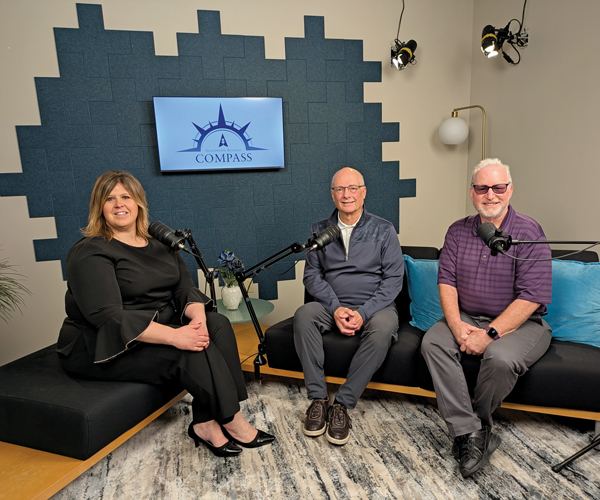At first glance Randell McShepard looks distinctly out of place standing outside the gates to the Rid-All Green Partnership, an urban farm in Cleveland’s lower Kinsman neighborhood. The immediate past president of the Union Club and current vice president of public affairs for Medina-based specialty coatings manufacturer RPM International is immaculate in a perfectly pressed white dress shirt, tie, charcoal-gray suit slacks and polished black loafers.
But McShepard is clearly at home as he shows off the roughly 7½-acre spread, a nonprofit he and two childhood friends from the Lee-Miles neighborhood started seven years ago to educate people about the benefits of eating fresh, healthful foods and illustrate how to grow them for self-sustenance or profit. It’s a garden of eatin’ in a food desert where grocery shopping typically is done in minimarts, dollar stores and gas stations. Although the 53-year-old Beachwood resident spends eight to 10 hours a week as an unpaid business adviser, treasurer, public relations/marketing executive, fundraiser, grant/contract writer and business instructor, he knows a thing or two about growing things — he spent summers during his late childhood working on his paternal grandparents’ Mississippi farm. And he’s gotten his hands dirty here, most notably by helping clear the initial 1.3 acres, leased from the city, of mountains of debris.
“This area was long known as the Forgotten Triangle because it was the most notorious illegal dumping zone in the entire city,” he says. “I’m talking 40-foot-high mounds of construction waste, burned-out cars, tires, dead bodies, you name it.”
He points out the RTA Rapid tracks to the north, railroad tracks to the east, an industrial zone to the west. “No eyes on the street, nothing going on at night. When we first came down here, all the streetlights were out, so it was pitch-black. Being off the beaten path, it became a place where people became very comfortable coming to dump.”
Today, the place is downright bucolic. Fruit trees — apple, pear, peach, apricot — line one fenced edge of the property, along with raspberry, blackberry and elderberry bushes. Landscaped flowerbeds, complete with whimsical sculptures, surround the two greenhouses and four hoop houses, each of which boasts sets of six-panel doors for entry. Inside one hoop house, rows of beets, spinach, kale, Swiss chard and bell peppers, each interspersed with specific flowers and herbs that repel their respective pests, grow in 2-foot mounds of “black gold,” a compost Rid-All makes from rotting produce provided by the Cleveland Food Bank and Cleveland Food Terminal, coffee grounds collected from area Starbucks and McDonald’s and wood chips made from downed branches and the like supplied by the city forestry department and other local tree companies.
“The quality of that soil is unbelievable,” he enthuses. “Whatever we put in it, it just explodes.” The heat generated by “hot mix” compost piles of wood chips, coffee grounds and beer waste from Black Box Brewery in Cleveland Heights and Little Mountain Brewery in Kirtland helps keep hoop-house temperatures above freezing in the winter, allowing the farm to raise cold-weather crops such as cruciferous veggies.
One 1,800-square-foot greenhouse is devoted to raising 3,000 to 4,000 black tilapia and red tilapia in four tanks, each of which utilizes an aquaponics-hydroponics system that cleans and reconstitutes the water by circulating it through overhead plant “grow beds.” Like the produce, the fish have been sold to restaurants, caterers, groups planning events and area shoppers, the last through Groupon and Amazon Local. Some of the 1,500 to 2,000 pounds of fruits and vegetables harvested annually end up at the West Side Market from time to time. Many customers, however, are neighborhood residents who drop by to purchase them. McShepard expects to increase annual fish production from a couple thousand to 100,000-plus after construction of a 7,200-square-foot fish house, built on 1.6 acres south of Otter Avenue purchased in 2014, is completed later this year.
“We want to get to a point from a volume perspective that we can…sign a contract for 80,000 fish [annually],” he says.
Behind the growing complex is a teepee on a platform, a structure used for staff meetings. A decidedly modern treehouse with bark-like siding — “one of our breakout offices,” as farm manager Marc White, one of two full-time employees and three part-timers paid from a $125,000 annual budget, calls it — is perched in a nearby tree.
“We call this the Disney World of urban agriculture,” McShepard jokes.
The idea for the Rid-All Green Partnership sprouted after McShepard’s friends Damien Forshe, owner of organic Rid-All Exterminating in Cleveland, and G. Keymah Durden III, an aeronautical engineer at a suburban aviation-repair company, read a 2009 research report on the demise of Cleveland’s urban neighborhoods that McShepard penned for PolicyBridge, the public-policy think tank he co-founded and chairs. One of the suggestions for revitalizing those areas was turning vacant lots into “income-generating enterprises.” Forshe and Durden proposed doing that by starting an urban farm.
“We said, ‘What the heck? Let’s give it a shot!’” McShepard remembers.
The trio signed up for a five-month training program in commercial urban agriculture offered by Growing Power, a nationally acclaimed Milwaukee-based nonprofit that helps provide equal access to healthful, affordable food. Backed by $20,000 to $30,000 of their own money, they leased their first lot from the city, set up the nonprofit and hired a few staffers. The Rid-All Green Partnership, a name inspired by Forshe’s business, quickly garnered support from the likes of the Sisters of Charity Foundation of Cleveland, which provided one of its first grants; Wal-Mart, which awarded a $100,000 grant the farm won in a national competition; and the JP Morgan Chase Foundation, which funded the first greenhouse, which was completed in February 2011 for $25,000. The farm harvested its first produce later that year.
“People started coming down, wanting to support the operation,” McShepard remembers. “We didn’t have a whole lot to sell. But the concept was clearly defined, and people were already stepping up.”
In 2012, Growing Power named Rid-All a regional outreach training center, one of 13 such facilities around the country. Founders and staffers, led by training superintendent Durden, offer a $2,200 five-month commercial urban-agriculture training program (actually a series of five monthly three-day weekends) that covers composting, aquaponics and hydroponics, urban agriculture and business development, along with $475 three-day and $125 one-day workshops that tackle each subject individually. McShepard estimates that more than 300 private citizens, garden-club members, nonprofit staffers, philanthropists and entrepreneurs have enrolled in the programs.
“I would say that 40 percent of all the people who have gone through our training over the years have not been Clevelanders,” he adds. “We’ve had them come from Detroit and Atlanta and Buffalo, New York, and Indiana, you name it.”
Just as important as Rid-All’s production of fresh fish, produce and educational programming is the life it has brought back to the neighborhood. McShepard estimates the farm draws 4,000 people a year. School groups (the farm has published a series of six Brink City: Green in the Ghetto comic books to educate children about everything from healthful eating to environmental stewardship), civic organizations, even conventioneers, regularly tour the property. Many become volunteers. The teepee is a popular rented venue for meetings and weddings, and the surrounding grounds a location for community festivals.
Traffic will only increase. Rid-All recently became an extension of Central State University, a place where students will study urban agriculture. Last year the farm bought 4.5 acres east of East 82nd Street to ramp up its ton-or-two annual production of compost, sold for $55 a cubic yard to individuals, gardening groups and partner organizations such as St. Stephen’s Community House in Columbus, where Rid-All set up a smaller version of its farm for a fee. There are blueprints for a community kitchen where Durden and White can expand programming from Vegan Saturdays, a monthly event featuring free samples of vegan dishes. McShepard even voices the idea of building a small housing development and community health and wellness center. The possibilities, he says, are endless.
“People come here and just oftentimes break down in tears,” he observes. “They’re overcome with emotion because they feel like, ‘Wow, this is the kind of thing that we know our communities are capable of. We always dream about it. We always talk about it. But these guys are doing it.’”




